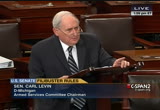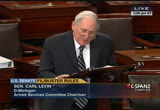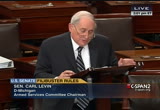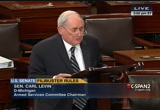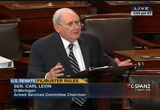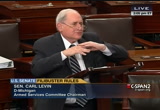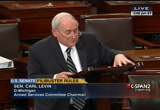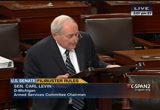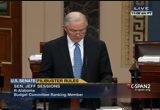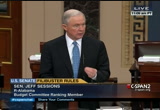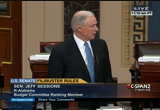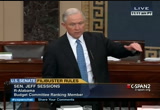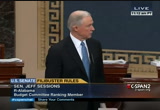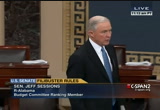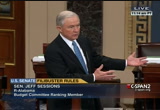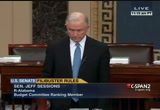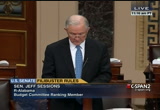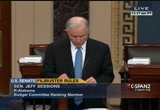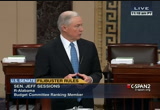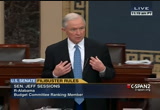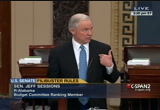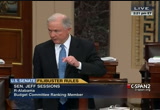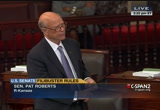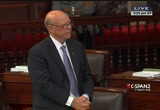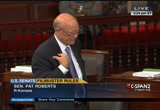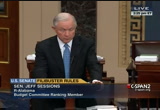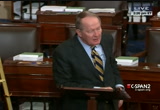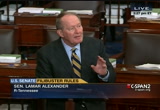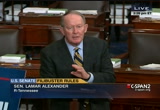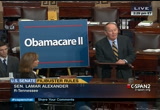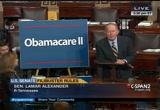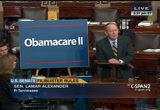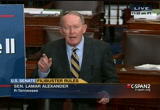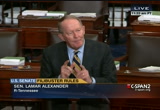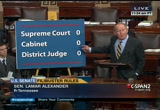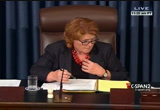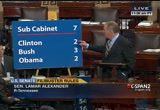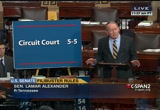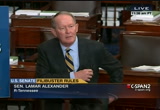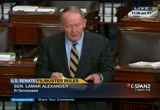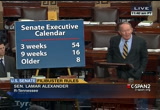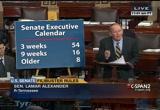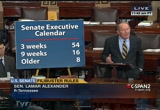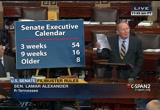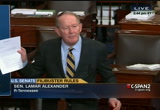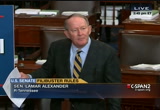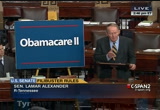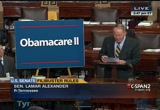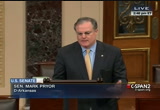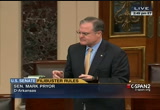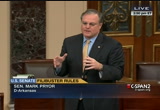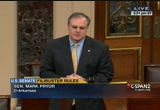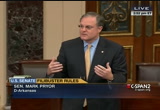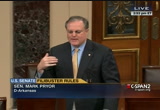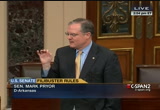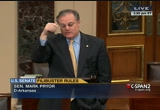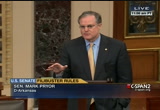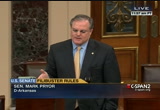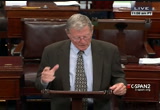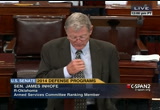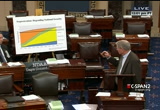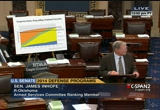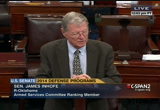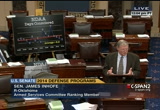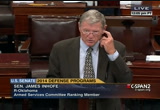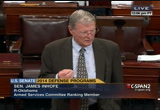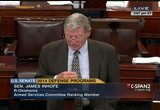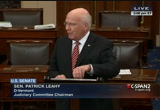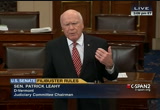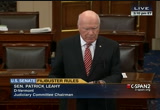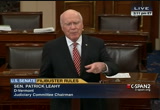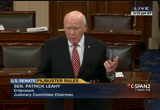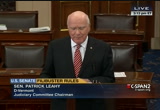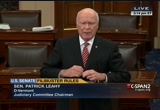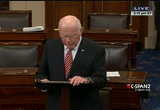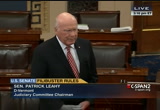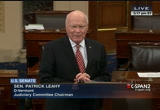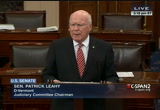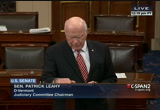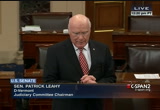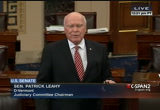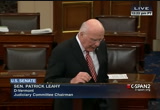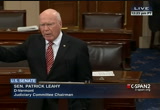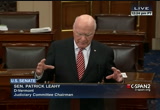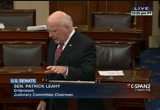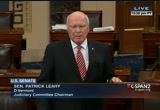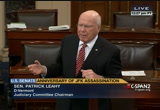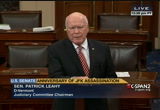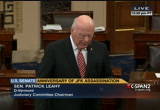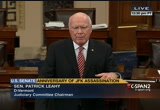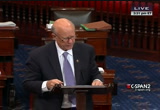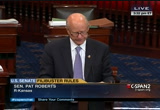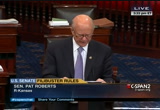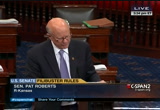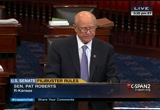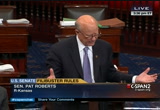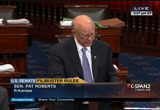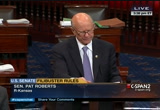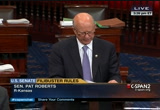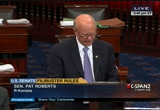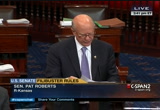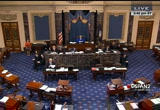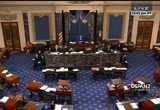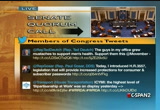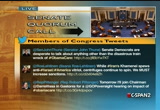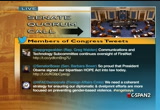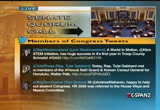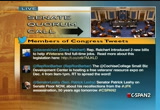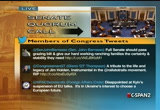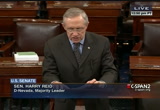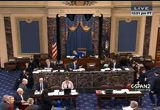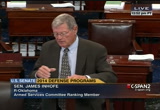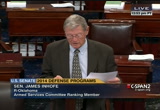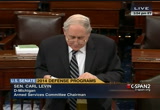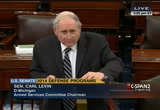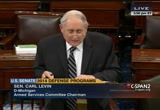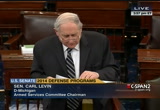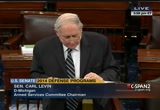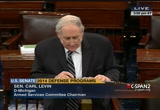tv Key Capitol Hill Hearings CSPAN November 21, 2013 2:00pm-4:01pm EST
2:00 pm
antidote to the malady. we have not used that antidote to the malady which besets this body, allowing the mere threat of a filibuster to succeed without challenging that threat, without telling the filibusters, go ahead, filibuster. we've got rules that protect us. and when you pause and when there's no one else here, 3:00 on the fourth day or the fifth day or the sixth day, the chair can put the question. the am -- the american people will then see in a dramatic way the obstruction which has flanes in this body -- which has taken place in this body. but before a senate majority assumes a power that no senate majority before us has assumed to change the rules at the will
2:01 pm
of the majority, before we do something that cannot easily be undone -- and we have now done it -- before we discard the uniqueness of this great institution, let us use the current rules and precedents of the senate to end the abuse of the filibuster. surely we owe that much to this great and unique institution. there was a conversation, which was a formal conversation, between the majority and the republican leaders just last january, and here's what the majority leader said. "in addition to the standing order," which is what we had adopted, "i will enforce existing rules to make the senate operate more efficiently. after reasonable notice, i will insist," he said, "that any senator who objects to consent
2:02 pm
requests or threatens to filibuster come to the floor and exercise his or her rights himself or herself. this will apply to all objectionobjections and unanimot requests. senators should be required to come to the floor and participate in the legislative process, to voice objections, engage in debate, or offer amendments. and finally," he said, "we will also announce that when the majority leader or bill manager has reasonably alerted the body of the intention to do so, the senate is not in a quorum call and there's no order of the senate to the contrary, the presiding officer may ask if there's any further debate, and if no senator seeks recognition, the presiding officer may put the question to a vote." he said, our majority leader, that "this is consistent with the precedent of the senate and with ri riddick's senate
2:03 pm
procedure." what this showed again is that if we in the majority have the will power -- as much will power as has been shown by some obstructionists in this body -- if we have an equal amount of will as they have shown, that the current rules before this change today can be used to force filibuster filibusterers o filibuster, to come to the floored and talk. all we need to do is to use the rules, to take the weekend off, to take the week that we hope for a recess and use it to come back here, to take the recess itself, if necessary, during the summer -- for a month, if necessary -- to try to preserve what is so essential to this body, its uniqueness; which is that the majority cannot change
2:04 pm
the rules whenever it wants. the house of representatives can change the rules whenever it wants. it's called a rules committee. they can adopt and modify the rules at any time -- and they do. this body has not done that. we've resisted it. the we've attempted to do it. we've come close to doing it, but we've never done it -- until today. do i want to amend the rules? do i. i want to amend these rules with all my heart. i want to embody a principle that a president, regardless of party, should be able to get a vote on his or her nominees to executive positions and to district and circuit courts. i believe in that. i think most senators believe in that.
2:05 pm
we need to change the rules. but to change it in the way we changed it today means there are no rules except as the majority wants them. it is a very major shift in the very nature of this institution if the majority can do whatever it wants by changing the rules whenever it wants, with a method that has not been used before in this body to change the very rules of this body. we should have avoid add nuclear option. we should have avoided violating our precedents. we should have avoided changing and creating a precedent, which can be used in the same way on legislation. it may give comfort to some today, but this is only on judges, this is only on executive appointments. this precedent can equally available to a majority that
2:06 pm
wants to change the rules relevanrelative to the legislate process. madam president, those who have abused these rules -- mainly on the other side of the aisle -- whether they acknowledge it or not, are contributors to the loss of protections which we see today for the senate minority. given a tool of great power, requiring great responsibility, they have recklessly abused it. but now i am afraid that it won't just be them that will pay the price. in the short term, judges will be confirmed who should be
2:07 pm
confirmed. but when the precedent is set, the majority of this body can change the rules at will -- which is what the majority did today. if it can be changed on judges or on other nominees, this precedent is going to be used, i fear, to change the rules on consideration of legislation, and down the road -- we don't know how far down the road; we never know that in a democracy -- but, down the road, the hard-won protections and benefits for our people's health and welfare will be lost. i yield the floor. mr. sessions: madam president? the presiding officer: the senator from alabama. mr. sessions: madam president,
2:08 pm
thriet throughouthroughout our , we've had senators like senator levin. and before he departs, i want to thank him for his principled approach to this complex issue and just would share with all of our colleagues, he's completing his service in the senate this year. he's not running for reelection -- and certainly would have been reelected. but i was this weekend at a conference of -- a national security conference at the reagan library and the first winners of an award for national security were former secretary of defense gates, who served two presidents, and senator levin was the other winner of that. i think it is a tribute to his commitment to the -- to this country. we've disagreed on a lot of issues, and no one should think he's not a strong and effective advocate for values around here. but i think all of us should
2:09 pm
listen to his remarks. and his warning -- it is a very simple warning. that warning is that if a majority can change the rules for the simple majority vote in order to defeat what heretofore was a right of a minority party in the senate, there are no minority rights left. they simply exist at the will of the majority. this is a fundamental matter. it's an important matter. we've had some close calls and a lot of intensity, but we've avoided this kind of action. i think it's fair to say, without dispute, that the significance of this rule change today dwarfs any other appeal of the ruling of the chair that we've seen, maybe in the history of the republic; certainly -- maybe in the history of the
2:10 pm
republic. this is a big event, and it changes what goes on here, because we deal with power and the exercise of power. and this whole thing is simply majority leader reid -- and he's got a difficult job, and i've tried to not make his life more difficult than it needs to be -- but he's not a dictator. he does not get to dictate how this senate is operated. he does not have the right to come in and change the rules because he wants to fill three judgeship slots that are not needed -- no way close. there is no way you can justify filling these court slots, as based on simple need, caseload, or judge. so he's unhappy about that. maybe he wants to change the
2:11 pm
mood of the country from obamacare and the overreach that was executed here to pass that bill on december 24, to ram it through the senate on a straight party-line vote. i suspect that's part of it. but this is not the way to do business here. the only reason those judges were blocked -- the only reason they did not get a confirmation -- was because we didn't need them. this country is going broke. there are districts in america that need judges. the d.c. circuit does not need more judges. it doesn't need the eight they have. yes, they have three vacancies, but with the current eight judges, their average caseload per judge was 149. and they've been continuing to drop. my circuit, the 11th circuit, madam president, you'd be interested to know, has an
2:12 pm
average caseload per judge of 740. the next-lowest caseload per circuit is twice 149. the average is well above that per circuit. well above twice that. the judges themselves say they don't need anymore judges. they take the whole summer off. these judges would not have been rejected, if we'd needed them. but the president is so determined to try to leave a legacy of friends on that court, that he just shoved them anyway and demanded that the senate pass them. and senator reid demanded that we confirm these judges. the judges say they don't need anymore judges on that court. they don't need them, whether they say they need them or not. i know how to look at the
2:13 pm
conveyingloads. i'm -- i know how to look at the caseloads. i'm on the judiciary committee. i've chaired it and been ranking member of it for years sms i -- for years. i know how to do weighted caseloads. ness nthere is no justificationr filling a single slot on that complete ancourt. i know we can't keep throwing money away for no good reason. the last thing we do should be able -- should be asking the american people to fund a $1-million-a-year judge. that's what the staff are estimated to cost -- three of them. it's like burnin burning every 1 million on the mall. we don't have $1 million to throw away. but we do have judges, we do have circuits, we do have district courts that -- around the country that are overloaded. and we are going to add some
2:14 pm
junls to them. and we ought to -- and we are going to add some judges to them. and we ought to close these judges and move that judge there, like any commonsense person would dovment so it -- wd do. so it wasn't any animu animus tt led to this. senator grassley and i block president bush from filling one of the slots. oh, they wanted to fill the slot. they thought it might leave a legacy judge that would be influential to them. that's what they suggested. but we refused. we were actually able to transfer one of those slots to the ninth circuit. that's what good business should be done around here. but we certainly are at a point where we don't need to nai to ft slot, and it should in no way -- it should in no way cause the
2:15 pm
majority leader, senator reid, to feel like his power was threatened. his majority was threatened. we're going to change the rules of the senate, change the rules of the senate, so he can get three judges confirmed. we dand i'll be prepared to debate that issue anywhere, any time. on the merits, not one of those slots should be filled, not one of them. it is the lowest caseload her judgper judge in america and tho not have such complex cases that cellulose down their work and demands more judges. that's been analyzed and it's not true. well, senator reid asked for
2:16 pm
this job. that's what my wife says to me when i complain, don't blame me, you asked for the job. so he asked to be majority leader of the united states senate, and it's not easy. you've got lots of members. you've got lots of different ideas about what ought to be done. trent lott called it herding cats. i suppose that is a pretty good description of it. he said one time it's like putting a bunch of frogs in a wheelbarrow. you put one in, two jump out. it is not easy to run the senate. i understand that. but changing the rules by simple majority vote to significantly alter the tradition of the senate is a dangerous thing. senator reid says we've been wasting time on the procedural hurdles thrown up in the senate. he said congress is broken and the american people think that
2:17 pm
congress is broken. well, they think it was broken when they used legislative ledger domain on december 24 before scott brown from massachusetts could take office to pass an immigration bill that -- pass a health care bill that the american people overwhelmingly opposed. maybe the american people, part of the frustration with the congress is they passed a bill without a single republican vote in the house or the senate, rammed it through, that the american people opposed. maybe that's why the american people are not happy with us around here. but let me explain, colleagues, what it is that's causing the greatest frustration in the senate. it's a trend that began some years ago, not long after i came to the senate 17 years ago, and
2:18 pm
it's just accelerated. and it's reached a pace on the majority leader reid we've never ever seen before, and it undermines the very integrity and tradition of the senate, and it's got to stop. and we've got to recover the tradition of this body. we owe it to those who will be filling these seats years to come. and this is the problem. a maneuver was discovered called filling the tree, a parliamentary maneuver that the majority leader, who gets recognition first in the senate, seeks recognition, and then he fills the tree, and the parliamentary maneuver basically blocks anyone else from getting an amendment. you can't get your amendment up. so how do we have an amendment. well, you have to go hat in hand
2:19 pm
to senator reid and say, senator reid, i'd like an amendment. well, i don't think so, i don't like that amendment. but i like it. i want to vote on it. sorry, we don't want to vote on it. and this is the way it goes. and it's been going every year. this defense bill that commonly had 30 or more amendments of substance when it hit the floor, it's $500 billion. the biggest appropriations bill we have, $500 billion. senator coburn has an amendment that would save some money directly related to the defense department. senator reid won't give him a vote on that. people say why don't you do something, sessions. why don't you get an amendment passed. you can't get it brought up unless he agrees. and he says it's because of delay. he says it's because, that it
2:20 pm
creates time difficulties. but we've been a week on this bill. we haven't had but two votes. we've gone days with no votes. it's not time. let me tell you what it is. the majority leader of the united states senate is protecting his members from tough votes. he does not want them to have to cast votes on critical issues in this country, and it's not time, it's not delay. it's plenty of time. we could have cast 15 votes already on this bill and wouldn't have many left, and everybody would be satisfied. and that's the way it was when senator mcconnell came here. that's the way it's been. that's the way it was when i came here. we had 60-something votes on a bankruptcy bill. it went on three weeks. so this is causing tension. this is causing frustration.
2:21 pm
and one of our new members to the senate, when we were debating this very question some months ago said they tell us we have to get senator mcconnell's permission before they'll let us get an amendment. and i said, wait a minute, do you not understand that you are duly elected senator from a state of america, and you have to ask permission of the republican leader before you can get a vote on an amendment? i mean, how did this happen? so this is a background issue that we have that is undermining collegiality in this body. i'm tired of asking the majority leader for permission to give me a vote in the united states senate. a senator: would the senator yield? mr. sessions: yes. mr. roberts: i'd just like -- mr. sessions: senator from kansas, i yield for a question. mr. roberts: i'd like to point out, i'm assuming his situation
2:22 pm
is very similar to the situation that i find myself in. about a year ago we had a farm bill up. i was the ranking member of the committee. we voted 73 times. we had over 300 offered. as amendments came forth and the first amendment had nothing to do with agriculture, basically we got through it in two and a half days. now move ahead to this year's farm bill, i think there were ten votes. senator thune, who's been on the committee for a long time -- we respect his voice and we respect his amendments, he had about four. senator grassley has been on the committee for a lot longer. he's always got amendments on the farm bill. senator johanns is a former secretary of agriculture, excellent senator, excellent representative for nebraska and a real voice for agriculture. he had several amendments. personally, i had about two or three amendments. i would have liked to have been considered.
2:23 pm
the reason i'm mentioning them is we all agreed to hold off on committee if we could raise them on the floor because we wanted to expedite it because the big issue is time. we don't have time for a farm bill. usually farm bills take a week or two weeks. that's not the case anymore. we did it in two and a half days last year. this year we were expecting to have votes. none of us, none of us got amendments. after ten, maybe seven -- i think it was ten votes, bingo, it was cut off. and the majority leader controlled the effort. this is like the house. this is like the rules committee. i remember when i was in the house. i remember we had a roberts-stenholm amendment. mr. sessions: in the house, senator roberts, you can't get an amendment voted on unless approved by the rules committee? mr. roberts: that is correct. mr. sessions: that is the difference in the house and the senate. mr. roberts: we had a robert stenholm amendment at that point
2:24 pm
while we were in the minority, the republicans and charlie stenholm was the democrat and he whispered and said you might want to make this the stenholm-roberts amendment. i figured that out and we had our amendment made in order. i thought as the rules committee, as a younger member of the house at that particular time was based on the merits, whether it was germane, et cetera, et cetera. it was not. one of the reasons i decided to come to the senate was you could offer an amendment at any time on any subject unless it was something involving national security or whatever. i understand that. now what we have is the one-man rules committee. i really -- i deeply resent that. i just think that -- and i feel so sorry for the senate and i feel sorry for the members who come here and are not able to have their amendments considered. one of the first things i did as
2:25 pm
the ranking member of the senate agriculture committee last year was to promise a lot of people on our side that had never had the opportunity to offer an amendment before. i said you will if i can get this thing done. and we did. we opened it up and it was one of the few bills that went under regular order and we got things done. now there's only one house. there's the house and there's the senate, just like the house, and that's a shame and i thank the distinguished senator for his comments. mr. sessions: i thank the senator so very much. his insight is correct. i'll wrap right up and say what happened today is a very, very significant and sad day. it represents the greatest alteration of the rules without a proper procedure that we've probably seen in the history of the republic. it erodes legitimate minority rights in a way that subjects
2:26 pm
every right a minority party has in the senate and right any individual senator has in the senate, places that at great risk so that at any time the majority can do that -- and that's what was so eloquently explained, senator alexander by senator levin a few moments ago. i was so impressed with his analogy. we'll wrestle through this and work at it. i know senator alexander has worked hard in every way possible to avoid this day. he has expressed great interest in it, and i look forward to hearing his comments at this time on where we are and what's going to happen to us. i thank senator alexander, and i yield the floor. mr. alexander: madam president? the presiding officer: the senator from tennessee. mr. alexander: madam president, i thank the senator from alabama for his thoughtfulness, his leadership and his reminding the senate as senator byrd used to say to us that the purpose of the united states senate is to be a place
2:27 pm
where there can be an opportunity for unlimited discussion and unlimited debate and unlimited amendment. that's why we're here. and as senator byrd used to say so eloquently, that it was the unique body in the world because it provided, provided the necessary fence, senator byrd said in his last speech to this senate when he spoke before the rules committee, the necessary fence against abuses of the executive -- remembering how this country was founded in opposition to the king and the popular excesses. that was what the senate is supposed to be. and, madam president, i'm afraid that ended today. that ended today. this action by the democratic majority today is the most important and most dangerous restructuring of the rules of
2:28 pm
the united states senate since thomas jefferson wrote the rules at the founding of our country. it creates the perpetual opportunity for the danger that alexis day tocqueville described that he thought most dangerous for our country when he came to our country to visit in the 1830's. the young frenchman said i see two great dangers for this new american democracy. one was russia, and one, he said, is the tyranny of the majority. this action today creates a perpetual opportunity for the tyranny of the majority because it permits a majority in this body to do whatever it wants to do any time it wants to do it. this should be called obamacare 2, because it is another example of the use of raw partisan political party for the majority to do whatever it wants to do any time it wants to do it. and in this case what it wants to do is to implement the president's radical regulatory
2:29 pm
agenda through the district of columbia court. that's what this is. it's not about a filibuster. a filibuster rule was the subject of the dispute, but it was how the rule was changed, how the rule was changed. it's a big football weekend in tennessee. vanderbilt university plays the university of tennessee in knoxville. next week alabama plays at auburn. or maybe that's this week. big football games coming up. let's imagine this. let's say the vanderbilt-tennessee game being played at knoxville, home of the university of ten, vanderbilt gets home with one yard line and the university of tennessee says well, we're the home team so we'll just add 20 yards to the field or whatever it takes for us to win the game. or the boston red sox playing at
2:30 pm
home, let's say they're behind the cardinals this year and they get to the ninth inning, they're behind, and they say, well, it's our home field, we'll just add a few innings or whatever it takes so we can win the game. that's what the democratic majority did today. they said the rules don't allow us to do what we want to do, so we'll just change the rules to do whatever it takes to get the result we want. that's what they did with obamacare. we remember that. i was standing right here at this desk. it was snowing. it was the middle of the winter. senators were coming in in the middle of the night. and what happened? among the things that the american people like the least about obamacare was that it was crammed down the throat of the american people by the raw exercise of partisan political power with not one single republican vote. it's not the way the civil rights bill was passed, not the way social security and other great bills were passed. they were passed by a bipartisan majority so that we could gain
2:31 pm
the support of the american people. but our democratic majority must have liked that obamacare night. the american people aren't liking it so much because apparently nobody read the bill very closely, and we have millions of americans who have their policies canceled. we're going to have millions more when employers start looking at the costs of obamacare. this is obamacare ii, madam president. this is another exercise of raw partisan political power for the democratic majority to get the -- to get the result it wants, and there is only one cure for it, and that is an election. an election that is coming up in about a year. the american people can speak, and in the meantime, this has been the most dangerous, most important restructuring of the united states senate since thomas jefferson wrote the rules. it is, according to the senator from nevada, who is the majority leader, it is, according to his book in 2006, the end of the united states senate. that's what he said this would be, and now he has done it.
2:32 pm
he has written the end of the united states senate by his actions today. the senator from michigan, senator levin, said to all of us when we were discussing this earlier this year, he reminded us of the great senator from michigan, arthur vandenberg, who was the a author of the idea ofa bipartisan foreign policy. senator vandenberg said shortly after world war ii that a united states senate with a majority -- in which a majority can change the rules any time the majority wants is a united states senate without any rules. may i say that again. a united states senate in which the majority can change the rules any time the majority wants is a united states senate without any rules. so this is not about the filibuster. this is another raw partisan
2:33 pm
political power grab so the democratic majority can do whatever it wants to do whenever it wants to do it. it is obamacare ii, and the american people will see it that way when they can take time from their web sites trying to fill out their new insurance policies to have to pay enough attention to it. now, what is the excuse for this extraordinarily disturbing action today? it is the flimsiest of excuses, madam president, and i want to take a few minutes and outline -- and outline what those are. the first question -- the first allegation was that the republican minority was using the filibuster to keep president obama's appointees from gaining their seats. well, let's look at the history from the congressional research service. so how many supreme court nominees have ever been failed
2:34 pm
to be seated because of a failed cloture vote? that's a filibuster. the answer's zero in the history of the senate. not just president obama but the history of the senate. someone might point to the abe fortes case when president johnson in the 1960's engineered a 46-47 cloture vote, so in johnson's words abe fortes could hold his head up, but in fact the filibuster has never been used to deny the supreme court justice his or her seat. how many cabinet members of president obama have been denied their seat by a filibuster? zero, madam president. this is the congressional research service. now the majority leader said well what about secretary hagel, the distinguished defense secretary?
2:35 pm
he had to said 34 days to be confirmed. why shouldn't he wait 34 days to be confirmed ?s every? he was confirmed shortly after his name was reported here. we had a perfectly adequate secretary of defense sitting in the office at the time, secretary panetta. i remember the senator from nevada stating what if we're attacked and senator hagel isn't there? secretary panetta was there. the number is zero. mr. inhofe: would the senator yield for a unanimous consent request? i ask unanimous consent that after the senator from tennessee's remarks, that we hear from the senator from arkansas, senator pryor, and that i be recognized after senator pryor for such time as i may consume. the presiding officer: is there objection? mr. alexander: and if the senator from oklahoma needs to speak now, i would be glad to -- okay. the presiding officer: without objection. mr. alexander: my point was the charge is that republicans had been denying president obama his
2:36 pm
nominations by filibuster. not on the supreme court, not to his cabinet and no district judges, madam president. how many in the history of the country have ever been denied their seats by a failed cloture vote, including president obama? the answer is zero. maybe it was some other nomination that would cause such a problem that would justify this dangerous restructuring of the senate rules. let's go to the sub cabinet. these are all the executive appointments below the cabinet level. how many of those have been denied? under president clinton, the senate rejected two nominees of his by cloture vote. under president george w. bush, it was three. under two -- under president
2:37 pm
obama, it has been two. so, madam president, in the history of the united states senate, the cloture vote has been used to deny seven presidential nominees their seat and president obama two. well, let's go to the one area where there has been a little bit more, and that is the circuit judges. now, remember on the supreme court, district judges never, cabinet member never, but circuit judge, yes. there have been ten instances where presidential nominees for the federal circuit courts of appeal have been denied their seats because of a failed cloture vote. that is a filibuster. five democrats, five republicans. well, how did this happen, given all these other areas that it never happens, why did it happen? because as the republican leader spoke this morning, democrats got together in 2003, the year i came to the senate, and said for the first time in the history of the united states senate we're
2:38 pm
going to use the filibuster to deny president george w. bush ten nominations to the circuit court because they are too conservative. not because they are not qualified. one was miguel estrada, one of the most highly qualified nominees ever presented. one was judge pickering. one was judge pryor who used to be a law clerk to judge wisdom, as i once was, and i know the high respect that judge wisdom had for him. so the end result was that we had this gang of 14 and the democrats ended up only stopping five of president bush's judges, but that was the first time in the history of the senate, and today including the judges that we're discussing now, the three on the d.c. circuit court, the total is five. so that is it, mr. president -- madam president. i mean, how can one say that president obama has not been
2:39 pm
treated fairly when in fact the answer is zero on supreme court, zero on district judges, zero on cabinet and the -- two on sub cabinet and the same on circuit courts that president bush had? i ask the senate historian if president obama's cabinet nominees had been moved through the senate more swiftly or slower than those of his two predecessors, bush and clinton. the senate historian told me it was about the same. so on that question, that's a fake crisis. now, the second allegation was that it takes too long for president obama's nominees to come through the senate. well, madam president, we have something on our desk called the executive calendar. every senator has this.
2:40 pm
there are 44 senators that are first term and maybe some haven't had a chance to read it very carefully, but it has on it all of the names of everyone who could possibly be confirmed. the way the senate procedure works, you come out of a committee to the executive calendar. now let me state the obvious. all of the committees are controlled by the democrats. so if we want to report someone for the neighbor labor relations board, it has to be approved by a majority of the democrats on the committee on which i serve. so you get on this calendar by a majority of democrat votes. so how long have the people on the calendar been waiting? well, 54 of them have been waiting only three weeks. in other words, they just got there. most of them aren't controversial. usually they are approved at the -- on a day like this when we're wrapping up before we go home for a week or two, so half of them would be probably gone today. there are 16 who have been on
2:41 pm
the calendar for up to nine weeks. that's a very short period of time in the united states senate for people to have a chance to do their other business and get to know the nominees. there are eight who have been on the calendar more than nine weeks, and of the eight, two are being held up by democrats, two more are congressman watt and miss millett. that leaves four, and one of those is a newscaster who has been nominated to be a member of the board of the morris k. udall foundation who is being moved along with other people to that foundation board. in other words, madam president, it is not true that there are people being held up for a long period of time, because the only way you can be confirmed in the united states senate is if the majority leader takes someone from this executive calendar, moves their nomination. it doesn't have to go through any sort of other motion. he can do it on his own.
2:42 pm
and then, then we move to consider that person. well, you might say but we can hold each one of those up. yes, you can under the cloture procedure, but let's take an example. let's say senator reid, the distinguished majority leader, were to come under the old rules to the floor and say i believe that republicans are holding up ten, ten of our nominees in an obstructionist way. so let's say he arrives on monday and he files cloture, he moves to confirm all ten of those. remember, he's the only one who can do that. he takes him off this calendar. he moves they be confirmed, and he files cloture on each of the ten on monday. tuesday is what we call an intervening day. he can get the rest of them confirmed by bankers' hours by friday if he wants to. because after he has that intervening day, there can only be, because we changed the rules
2:43 pm
earlier this year, four hours of debate, and then you go to the next one and then you go to the next one. so you have got 40 or 45 hours, you have got them all. so the majority leader, if he wished to, could confirm all of these people very easily unless, unless 41 republicans said no. but what we've already seen is that almost never happens in the history of the country. it's happened twice to president obama on his subcabinet members. never on a cabinet member. never on a -- twice on subcabinet members and never on district judges. so the majority leader had plenty of opportunity to have everybody confirmed if he wanted to. this is why senator byrd, who was majority leader and minority leader in his last speech to the senate said there is no need to change the rules.
2:44 pm
i'm paraphrasing. he said a majority leader can use the rules that we have, that was until today, to do whatever he wants to get done. so -- and then there is the last charge that the district of columbia circuit -- let's go back -- the district of columbia circuit, that was the pretext -- that was the other pretext for this. somehow republicans were doing something wrong by saying that it's too soon to cut off cloture, to cut off debate on the president's three nominees for the district of columbia circuit. district of columbia circuit. madam president, republicans were doing to the letter exactly what democrats did in 2006 and 2007. they were saying that that court is underworked, that other courts are overworked, and we ought to move judges from where they're needed least to where they're needed most before we
2:45 pm
put any more judges on the court. this was a letter sent july 27, 2006, by all the democrats on the senate judiciary committee, including leahy, schumer, feingold, biden, ted kennedy. they said -- quote -- "under no circumstances should president bush's republican nominee be considered much less confirmed by this committee before we address the very need for the judges on the committee, and all we in the republican party were saying senator grassley has had his bill in since 2001. the democrats said in 2006 we shouldn't put any more judges on the court until we look at where the judges are needed. we're saying consider senator grassley's bill before you confirm the judges. and so that's the excuse. the filmsiest of excuses. there's nothing to the idea that president obama is not being treated at least as well as
2:46 pm
previous presidents on his nominees. the filibuster has not been used to deny him nominees except in two cases for subcabinet members and in the case of circuit judges, no more than with president bush. the majority leader has not used the rules that he had before him to easily confirm the people on the executive calendar and those on the executive calendar for the most part have only been there for a few weeks. so why, then, did the majority feel the need to take this extraordinary action and that takes us back to where we start. this is very simply, madam president, another partisan political power grab to permit the majority to do whatever it wants to do any time it wants to do it. the american people, millions of them, are filling out their insurance forms, they're trying to make the web site work, they're terrified by the fact they may not have insurance by january 1. that's totally the result of a partisan political power grab in
2:47 pm
the middle of the night three years ago that put obamacare into place. this is another example of that. the only cure for that is a referendum next november. madam president, i deeply regret the action the democrat majority took today. it is the most dangerous and the most consequential change in the rules of the united states senate since thomas jefferson wrote those rules at the founding of our country. i ask unanimous consent to include in my remarks the letter from the senate democrats in 2006 arguing that the d.c. circuit should have no more judges until we consider the proper number. i'd like to also ask consent to have the one-page list of the total number of subcabinet members who have ever been denied their seat by a failed cloture vote, and that number is seven in the history of the
2:48 pm
senate, two under president obama, plus five bush judges and five obama judges. i thank the president. i yield the floor. a senator: madam president? the presiding officer: the senator from arkansas. mr. pryor: madam president, i want to echo at least some of the sentiment that my distinguished colleague from tennessee just mentioned, that i'm disappointed in the use of the nuclear option. i opposed that. and i think that it could do permanent damage here to this institution and could have some negative ramifications for our country and for the american people. i don't want to be an alarmist about it but i do have concerns about it and i'm very disappointed that it got to this point. and i want to talk about that in just a moment but before i do, i'd like to say, you know, the senate if you step back, the senate was designed to be a place for debate.
2:49 pm
it's where members -- the way it's designed, the way the rules are structured, the size of it, the history of it, the members here can reach across the aisle and find solutions and that's what this country needs right now, we need solutions. we need people willing to work together to get things done. and part of that is to allow the minority to speak even if it's a minority of one. and, you know, we need to protect that right and we need to protect every senator's right to debate and to amend legislation, and i think no one here with a straight face would say there haven't been abuses from time to time on that. we know that. there have been and i've seen a lot since i've been here. but also if you step back and you look at the senate, it's really the only place in our government where the american people can actually see law being made. with all due respect to our colleagues in the house, you don't see law being made there.
2:50 pm
they come out of their rules committee and it's all pretty much set up and they right now at least tend to vote party-line, party-line, party-line, done. you don't see law being made at the white house when they're doing things like executive orders. all you know, you get the press release or see an announcement in the rose garden and that's it or you don't see law being made in the courts. a lot of in this country is made by the court, across the street at the u.s. supreme court, you hear the arguments and they go back in chambers. you don't know what they talk about, you don't know how that's working, then they come out with their decision, in some cases decisions because a lot of cases there's a dissent. but the united states senate is unique in that way. we're the only place in our government where you can actually see the law being made and it's also really just in that same sense, it's the only place where the minority is guaranteed a voice. they sometimes get outvoted,
2:51 pm
but they're guaranteed at least to be heard and i think that's important. so, again, i share the disappointment with many of my colleagues today in how this happened. the senate rules, i've worked with these rules for 11 years now, they can be arcane and frustrating, but the way it's designed is, it allows people to fight for their state's interests or their ideological beliefs, whatever it happens to be and the sense is that everybody is fighting for what's best for the country. they may disagree, that's why we should have votes eventually on these matters but it allows people to fight for what they think is right, best for their state, for the country, for the world, whatever the issue happens to be. since i've been here what i've tried to do consistently is to fight for -- to maintain the integrity of this institution. and so since i've been here there have been numerous times i've been part of bipartisan
2:52 pm
groups, probably the most high profile one was the gang of 14 back in 2005 where we worked out some judicial nominations, but nonetheless, i was part of that, just recently the levin-mccain group that helped to change the rules as the senator from tennessee talked about. and really what that's all about, it's just about working with senators from both sides of the aisle to try to reach commonsense solutions, not just to protect the rights of the minority but also to improve the legislative process, to make sure this place works like it's designed and so certainly that's what i'll try to do every single day when i come here. because i do understand that if you're going to get anything done in washington, anything done in the senate, you're going to have to work together to do it. it's like in the book of isaiah. it's as -- it says come now, let us reason together. that's the one verse in the bible that sort of sums up the
2:53 pm
united states senate. come and let us reason together. and the senate should always be the place for that. let me make two last points on this nuclear option. first is, i would encourage the american citizens to be very, very careful in looking at statistics. they're difficult to use, they can be very misleading on this because almost always these statistics lack context. i hear the talking heads, hair folks on talk radio, i've even seen a few people right here in this chamber use these extensively and very often there's just no context. so sometimes, for example, if you just look at cloture petitions, you can have a filibuster without filing a cloture petition and you can have a cloture petition without there actually being a filibuster. so that will skew the numbers. bottom line is, there's plenty of blame to go around. plenty of blame.
2:54 pm
if one person says it's all the other side's fault, they're not being truthful. there's plenty of blame to go around on this. both parties are at fault. i'll give you one example. it wasn't too long ago i heard people say the d.c. circuit's workload was sufficient, that they needed more judges. guess what, now i heard those same people say that the d.c. workload is so light they don't need any more judges. the shoe is on the other foot. democrats back in the day said the d.c. circuit had a light workload, didn't need more judges. now democrats are saying it does need more judges. we need to stop the games and just get back to work. i think there's one way to fix this. that's by following the golden rule. i think if we take those words of jesus literally and literally apply those to what we do here in the senate, do unto others as you would have them do unto you, and really mean that and really apply that to do unto
2:55 pm
others as you would have them do unto you, i think all these problems would go away. it's about respecting one another, about working with one another, respecting elections in other states and national elections, do unto others as you would have them do unto you and all this would go away. also a dose of forgive one another would also help. let me also spend a couple of minutes here thanking chairwoman mikulski. she has a tough job as chairwoman of the appropriations committee and she's an example of someone who really is determined to work together to get things done, trying to get the appropriations process back on track. no doubt it's been sidetracked this year and in recent years. this year we've seen what i would term an irresponsible few, especially down on the house side blowing up the farm bill, pushing for shutting down the government, getting us in a bad place on the debt ceiling, not trying to do the blame game
2:56 pm
but i know chairwoman mikulski is fighting very, very hard to put an end to that and we need to get back to our number-one priority. that should be growing our economy and creating jobs. there's lots of ways we can do that but one of those ways is through the appropriation process by investing in infrastructure. we can make responsible, targeted investments in our future with the right kind of spending on infrastructure, whether it's roadways or airports or schools, centers or innovation, whatever it happens to be, there's lots of smart ways to do that. in the history of this country shows that it is a winning strategy when we work together and make the right kind of investments in our future. and arkansas is a good example. we have a number of things we could talk about today, different things where federal spending has made a difference in our state. one is the biomeda water project started back in 1923, the subject of a lot of fights and i
2:57 pm
have scars to show i've been part of some of those fights but they're making great progress there and not only is it good for thousands and thousands of farmers but it's also great for drinking water and for flood control and there's 55,000 acres of fish and wildlife habitat that's being protected through this project. so it's a win-win for everybody. arkansas airports is another example. in our state you may not think of arkansas as an aviation state or an aviation powerhouse, we have 29,000 jobs that are tied to commercial and general aviation. $2.5 billion in our economy. and, again, that investment in infrastructure is what makes that possible. we also have the senate center for,to logical research near pine bluff, arkansas, lots of research on nan owe technology, a great technology park in fayetteville, trying to build one in little rock. and the focus on stem, et
2:58 pm
cetera. all of these things help create jobs and grow our economy. and congress needs to focus on that and i'm not saying it's going to be easy, but we need to work together, we need to pass a budget, we need to move our appropriation bills through the process and we just geed knead to bottom line get back on track. that's the way to move our economy forward is by really putting the interests of our country first and not these partisan and sometimes petty disputes. ideological disputes. we need to think about what's best long term for the country and, again, i think the appropriations process is the way to do that. madam president, with that i'd say i will yield the floor. the presiding officer: the senator from oklahoma. mr. inhofe: madam president, it's my understanding we may have a vote this afternoon. i've often said the most important bill that we pass every year and we passed every year since 19 -- for the last 52 years. that we -- and that's the
2:59 pm
national defense authorization act. i'd like to say this about the process we've gone through. i don't recall ever having worked with a chairman -- i was in the minority, that is so easy to work with as chairman levin has been on this defense bill. it's one we all understand we got to do. it's got to be a reality. and a lot of the things we do around here we could wait a month and do it, but on this we can't because right now we have men and women in the field, we have their paychecks, we have things that have to happen to keep this going as it has in the last few years. maintenance and modernization, if we were not able to pass this now our research and development would no longer be able to be there in time to take care of the immediate needs that we have. now, i'm very upset what's happened to our defense system, this administration -- under this administration we've lost
3:00 pm
$487 billion in defense -- coming out of the hide of defense. in addition to that we are now looking at sequestration. i'll only say this, maybe perhaps the last time, and that is why should our defense system that is only accountable for 18% of the budget be responsible for 50% of the cuts, and it's because we -- this administration has determined that's what's going to happen to the military. so now we have people like general odierno, the commanding general of the united states army who said -- and i quote -- "lowest readiness levels i've seen since i've been serving for the last 37 years and that only two brigades are ready for combat." admiral greener, c.e.o. of the navy. quoting now. "the limitations and situations we're in, we don't have another strike group trained and ready to respond to short notice in case of contingency. we're tapped out."
3:01 pm
and i think one of the -- admiral winifeld is the number two guy in the military system. it's the vice chairman of the joint chiefs of staff. and he said, "there could be for the first time in my career instances where we may be asked to respond to a crisis and we will have to say we cannot." well, i'd like -- i've given a lot of talks on the floor talking about the -- how serious things are right now. put the readiness chart up there. i would only comment to this. there's a lot of people who thinks there's an easier answer for this and that we can through efficiencies in the -- in the pebpentagon take care of these problems. a lot of work needs to be done. my junior senator certainly is going to be concentrating on that, on the efficiencies in there. however, if all the efficiencies were granted, that is only the blue line on this chart. this chart talks about sequestration, if nothing changes, what's going to happen to our military. so you have that. the next up there, the next
3:02 pm
large one, is force structure. we're talking about how many brigades, how many boots on the ground, how many ships, what it's going to look like. the next one up there is the -- is modernization. modernization is the very small line but here's the big one over here and that is our ability to fight a war. that's our readiness. and if you look down here at the bottom, that's fiscal year 2014 then 2015, so you can see all of that's going to be gutted in the first two years if we don't make a change in it. i've tried to do that. i have amendments. i still have an amendment that is out there that could correct that situation. but i think it's important people understand that it's the readiness that's going to be hurt more than and this is after $487 billion has been cut out of our defense system. i think general amus, the commandant of the marine corps, he testified under oath in -- and he talked about, he said --
3:03 pm
quote -- "we will have fewer forces arriving less trained, arriving late in the fight. this would delay the buildup of combat power, allow enemy more time to build its defenses and would likely prolong combat operations altogether. this is a formula for american casualties." he gets back to that orange line up there. the orange line is -- when do you that, you have to accept a greater risk, that means american lives. but i've already given that speech and right now we're getting close to the time when we're going to actually be casting a vote. and i have i think kind of good news, hopefully it's good news. i made a statement yesterday that the problem the republicans have is with this -- they have not been able to get amendments in. and we've gone through this in years past and always something as that broken loose where we're able to have amendments. well, up until yesterday, the republicans had 81 amendments that we wanted to be considered. frankly, that's not all that
3:04 pm
uncontrollable that. could have been done. we could still have gotten through that this week. but as it is right now -- and the good news is, i had said yesterday on the floor that i was going to come in and try to work all night long -- and the staff has done this -- to come up with 25 amendments and say, if we, the republicans, can have 25 amendments to be considere considered -- they can be voted down but just to be considered on the floor -- that we would be receptive to -- to having the results. and let's put the other. here's the interesting thing about it. we've heard a lot of people talking about, well, why all of a sudden this has to be done in five days. and yet we've been sitting around here for three months when we could have been considering it. and i'd like to suggest, if you look at this, this is every year how many days it's taken of consideration and it's always more than what we have for the rest of this week. i only say that because in spite
3:05 pm
of that, we still have a way of doing it. put the other chart up. and for those who might think that the regarded votes that we're requesting -- the votes that we're requesting, it's not going to be that many votes. we're asking for 25, the republican side. disemdemocrats have 25. that's 50. but if you look at years past, for example, last year we had total amendments offered, 106, but only 34 were voice voted, only eight required a recorded vote. i can go back to all the rest of the years that are on this chart, but the bottom line is this -- what i'm asking for today is 25 for the republicans, 25 for the democrats. of those, not more than 15-20 would require votes. we could do that in one day. so it can be done. we could finish this and still give republicans the opportunity to have their votes. so what i've got here is a -- a
3:06 pm
list of the 25 amendments that we are asking for. again, i'm not even for all 25 of them. but they should all be considered one way or another. probably would end up requiring maybe at the most ten votes. so i'm offering these amendments and telling the majority -- and, by the way, i've already talked about what the great relationship that we've had -- that i've had during this consideration as the ranking member of the -- of armed services can the chairman, chairman carl levin. so i'm offering to carl levin and to the democrats, the majority in the senate and the majority on this committee, these 25 amendments. all we're asking for is for those 25 to be considered and we can do this bill right, the way we've done it for 52 years and we can have a bill, we could have it by the end of this week.
3:07 pm
so i am offering that. i also announced yesterday that in the event that i can come up with 50 -- with a total number of 25 that our caucus would agree with, that if we could do that and -- and we're refused, when the time comes, i will vote against the -- the -- the -- going to the bill. and i -- i think that very likely could happen this afternoon. however, if they accept them, i am committing right here on the floor that i will be in full support and i will vote for it. and i want people to understand. in the unlikely event that the majority does not accept thes these -- the consideration of these 25 votes, that i will be voting against cloture on -- on the bill when that vote comes up. with that, i yield the floor.
3:08 pm
mr. leahy leahy: madam presiden? the presiding officer: the senator from vermont. mr. leahy: madam president, i'm not on the armed services committee although i was 38 years ago, but i would -- i would think that if there are any two people in this body who could work out a program to get the -- the vote set up -- the votes set up and voted on are the distinguished senior senator from michigan and the distinguished senior senator from oklahoma. i think the two of them as the leaders, the democratic and republican leader of the armed services committee, i would hope and encourage my colleagues on both sides of the aisle to listen to the two of them because i think they could probably work it out. madam president? madam president, i -- excuse me. there's been a lot of discussion about the major rules change
3:09 pm
that occurred here today. in my capacity as president pro tempore, i was presiding during that time and did not get a chance to speak. i just wanted to say a few things. in the four decades i've served here -- i've been here with both democratic majorities or republican majorities, during republican and democratic administrations -- and we've had moments of crises that i worried our political differences outweighed the senate's common responsibility, and yet we were always able to steer our way out of trouble. majorities of both parties have come and gone, but i've never lost faith in our ability to see ourselves through the divisions and do what's best for the nation. but the past five years has been discouraging. ever since president obama was elected, senate republicans have
3:10 pm
changed the tradition of the senate in escalating obstruction on nominations. they crossed the line from the use of the senate rules to abuse of the senate rules. in fact, the same abuse recently needlessly shut down our government at a cost of billions of dollars to the taxpayers and billions of dollars to the private sector. let me speak just of the judicial branch. i think it's a real threat to the independent judicial branch of government. as chairman of the judiciary committee, i worry that the republican obstruction is damaging our ability to fulfill the senate's unique constitutional responsibility of advice and consent. they have used these unprecedented filibusters -- and they are unprecedented -- more than at any time i've served
3:11 pm
here. they've stopped even nominations supported by republican senators from the state where the nominee came from. they forced cloture to end filibusters on 34 nominees, far more than we ever saw during president bush's eight years in office. in fact, this obstruction has left the federal judiciary with 90 or more vacancies during the past five years. it struck me because the very first -- the very first -- nominee to the federal bench that president obama sent here, a man by any standard extraordinarily well qualified and supported, strongly supported, by the then most senior republican in the senate
3:12 pm
and they still filibustered it. it's almost a case of saying, okay, mr. president, so you think you got elected; we're going to show you who's boss, we're going to treat you differently than all the presidents before you. this has never been done before, filibuster of the president's very first nominee. somehow this president is going to be told he's different than other presidents. now we've seen the trial court. i use the example of that, during the eight years that george w. bush served as president, only five of his district court nominees received any opposition on the floor. that is over eight years. in just five years, 42 of president obama's district court nominees have faced opposition, the majority leader had to file cloture on 20 of them. we all know what's happened here
3:13 pm
in the d.c. circuit. here's one example where the senate unanimously confirmed john roberts by a voice vote to the ninth judge on the d.c. circuit at a time when the caseload was a lot lower than it is today. he was confirmed unanimously. no democrat, no republican opposed him. but when patricia millett was nominated to that exact same seat by president obama, a woman with just as good qualifications as john roberts -- and they both have great qualifications -- she was filibustered. some say we shouldn't call that a double standard. well, i'm not sure what else one
3:14 pm
might call it. madam president, i do these not just to recite numbers, but i'm a lawyer. i've tried cases in federal courts. i've argued cases in federal courts of appeals. i consider that a privilege but i always went into those courts knowing i could look at that federal judge and say, it doesn't make any difference whether i'm a democrat or a republican, whether i represent the plaintiff or the defendant. this is an impartial court. but if we play political games with that federal judiciary, how long are the american people going to trust the impartiality of our federal courts? at what point do thee games thes start making people think maybe this is not an independent
3:15 pm
judiciary? if that day comes, madam president, the united states has given up one of its greatest strengths. let's go back to voting on judges based on their merit, not on whether they were nominated by democratic president or a republican president. let's stop holding president obama to a different standard than any president before him -- any president -- and certainly no president since i've been here. and i began with president gerald ford. i'd ask consent that my whole statement on this matter be placed in the record. the presiding officer: without objection. mr. leahy: and, madam president -- and seeing the distinguished presiding officer, who is not only a new englander but, in this case, from massachusetts -- let me just speak personally for a moment on
3:16 pm
a very, very sad day. tomorrow will be november 22. and ever since i was a law student, november 22 has always brought a feeling of dread to me. tomorrow will be 50 years since president kennedy was murdered. my wife marcel and i were living in washington at that time. she was a young nurse, registered nurse, working at the v.a. hospital on wisconsin avenue, a site now that is occupied by the russian embassy. she was helping me put this equally impoverished law student through georgetown law school. we had been there in this
3:17 pm
basement apartment, first during the cuban missile crisis. and, like everybody, we held our breath in this city, wondering if this new, young president, john f. kennedy, could get us through this crisis without plunging the world into nuclear war. i was excited -- we both were -- to be in the same city. my family has always been democrats back in jermt whe vern the joke was, "that's where the democrat lives," there were so few of them in vermont. but with an irish-catholic carnlg anfather, and italian-cac mother, and we had seen john kennedy win -- and in my state,
3:18 pm
something that doesn't exist anymore, an anti-catholic attitude. he stood up to those people, some in the joint chiefs, who said they had so much more experience and we ought to go ahead and we had nuclear superiority over the then-soviet union; let's attack them, let's have a preemptive strike. and, madam president, anybody who studies history knows what would have happened. half the world would have been destroyed. through patience and diplomacy, we got out of that situation. and so we watched a young president go step by step, not always accomplishing everything he wanted, but always inspiring young people.
3:19 pm
i remember standing on pennsylvania avenue and seeing an open car go by with him. he had greeted an emperor driving down pennsylvania avenue, people cheering. i was closer to him i a thaij t- than i am to the distinguished presiding officer, we all were. our class was invited to the white house and i was struck by how red his hair was and how young he was. but then i remember, as though it was yesterday, not 50 years ago tomorrow, but i was standing in the library in georgetown university law school. one of my classmates, who was not a fan of president kennedy, came in and says, the president has been shot. i told him there was nothing
3:20 pm
funny about saying something like that. the then i saw the shocked look on his face and realized he was telling the truth. we didn't have a car. i used to take the buses to school from where we lived in glover park area. i knew that marcel had been working all night and was probably home getting out of her shift in the wee hours of the morning and was home sleeping, and i went running out. i grabbed a cab, said i'd go home and tell her what had happened. i think i got the only cab in washington, d.c., that did not have a radio. the cabdriver didn't know what was going on. i just said, let's go. we drove by on "k" street.
3:21 pm
a number of stockbrokers were there. i remember seeing sometimes the ticker tape projected on the wall with the numbers going by of the stock market. it was blank, even though the stock market should have been open at that time. it was stopped. i saw mrs. kennedy's relative, mr. oshenschlosser, going to work -- being shoaferred chauffa rolls-royce. i was in an unair-conditioned bus. it was very obvious something was wrong. i got home, banged on the door, woke up marcel, we turned on our
3:22 pm
tv set. i told her he had been shot. she was coming awake, she said, who? i said, the president. we heard walter cronkite, something we keep seeing over and over announcing the president was shot and was dead. i know we prayed for him, his family, for our nation. phones were just seizing up in washington, but we talked with our family back in vermont. we decided when th when they weg to leave the quhows to bring the president's body -- to leave the
3:23 pm
white house to bring the president's body up to a few yards from where we're standing, we were expecting our first child -- he was born in january following this -- but we thought, even so, we should go down, and we took the bus down and we stood across from the national art gallery, what's now the west wing of the national art gallery. several lanes of rows there, and hundreds of thousands of people along the street, and it was so quiet, madam president -- so quiet -- that as the street lights, even though the roads were blocked, the street lights were going, as they changed from red to green to yellow, we could hear the click five lanes across the road. we could hear the click of those street lights changing, it was that quiet. and then we heard the drums, we
3:24 pm
heard them leaving the white house. that was back before you had cell phones and everything else you could follow. everybody on there turned down toward the other end of pennsylvania avenue, even though we could not yet see them, but we could hear them, it is what silent. and then the cars came by the cortege, a riderless horse, a little skittish horse. you could hear its horseshoes clicking back and forth, as it would pull back and forth against the reins, and the managmanleading it, the boots td backward in the empty saddle. i saw robert kennedy go by in a car. in fact, i took a photograph of
3:25 pm
that, his head bowed, his chin on his hand. it was such a sad, sad thing. as it went by, people saluted, held their hand over their heart and cried. again, madam president, it's like it was yesterday. we watched the funeral from ho home. mrs. kennedy had decided that all these world leaders who had come here, that they would march from the white house to st. matthews where the president's funeral would be held.
3:26 pm
i remember there had been a discussion, well, what do you do for protocol? you have presidents and prime ministers and emperors. she made the brilliant decision, take the countries he will if a be-- take thecountries alphabetn english. replendent in the uniform with braids and everything else, walking next to charles de gaulle who, like myself, is well over 6 feet tall, very plain uniform without decorations. nobody thought anything unusual about it. it was all so respectful. because so many heads of state, every police officer virtually in the city was downtown in that eamplet there wasn'area.
3:27 pm
there wasn't a crime reported or committed in d.c. at that time. everybody was glued to are theio their tv sets. the funeral in massachusetts, others there, young john kennedy, john jr. saluting the coffin as it went by. we were watching it when the burial at arlington cemetery, and we lived only a couple miles from there, and we saw the first jets -- the fighter jets flying over. we rushed outside just in time to see what we all know is the missing man formation, when the jets are in formation and one peels off. we saw that. and then we saw air force i fly
3:28 pm
over, just having gone over and dipped its wing. it was a very large plane at that time. and here's air force i in blue, white, silver, the same plane that brought president kennedy's body back a few days before from dallas. it was coming out of i is a liewght. -- it was coming out of saluting. i say this because thrie througt that time and everywhere we wernghts yowent, you saw silentd city, both those who supported president kennedy and those who had not, everybody knew what a blow this was to our country. in fact, i i did not see again that kind of shock and silence in washington, d.c., until i
3:29 pm
walked from my office on 9/11 here on capitol hill and saw the same thing after the attack on us. you know, madam president, something like this, most people you set aside political -- your political background. i remember so many of us stood here on that march day when president reagan was shot. we all joined hands, democrats and republicans, and prayed for his safety and for the country. it is awful you have to have a situation like that to bring people together, but we should think about the country first and foremost in these things.
3:30 pm
we look at those in succession of the presidency, we worry about what might happen. the president -- nobody ever wants anything to happen to any president, republican or democrat. but we don't want things to happen to our country. so i have, i was one of those young people inspired by robert kennedy -- by john kennedy, and by robert kennedy, who invited me to join the justice as a young law student, sometimes homesick and wanted to go back to vermont. i'm glad i did. these were people who inspired young people. they inspired us because we saw political life and elective office not as something for cynical gain or something to
3:31 pm
promote yourself or something where you could do bumper sticker sloganeering, i don't care the left or the right, but something to have, to make life better for everybody else and to make your country better and stronger and to leave a better country for the next generation. i think that was the promise of john kennedy. i am glad that many of both parties decided to follow that same promise. i just wish more would. madam president, i thank my colleagues for letting me have all this time. i yield the floor. a senator: madam president? the presiding officer: the senator from kansas. mr. roberts: madam president, i want to thank the distinguished senator from vermont for his remembrance of those days that are so special to him and are also to really
3:32 pm
commemorate them so they will be special to all of us. and i thank him for his comments. madam president, i'm going to speak as the ranking member of the senate rules committee, and i'm going to speak in regards to the rules changes that have occurred today. under the rules of this body, it takes 67 votes to end debate on 0 a rules change. as a continuing body, our rules carry on from one congress to the next, or at least they used to. and can only be changed pursuant to these rules. our rules have always ensured a voice for the minority in this body. unlike the house, where i served, where a simple majority has the power to impose a rule
3:33 pm
change at any time, in the senate the minority has always been protected. here the rules protect the minority and cannot be changed without their consent. unless, of course, the majority decides it wants to break the rules to change the rules. i am saddened that that is what happened today. madam president, "the washington post" reported the other day that president obama's approval rating has hit a record low. his disapproval rating has hit a record high, the worst of his presidency. this is obviously as a result of the disastrous rollout of obamacare which has caused americans to question both the president's trustworthiness and his basic competence. you would think in light of these developments that my friends, my colleagues on the other side of the aisle might be reconsidering the wisdom of some of their past additions. you would hope it would occur to them that maybe it was a mistake
3:34 pm
to pass the health care reform bill on a straight party-line vote. i'm one of the few that voted no in the help committee and no on the senate floor on christmas eve, christmas eve night. you might expect them to have some doubts about the competence of this administration, as most americans clearly do on this particular issue especially, and a lot of other regulations. and if it dawned on them that maybe now would be the right time to reassert congressional authority to rein in and redirect the administration, the executive, if you will, you would think they would be using the power of the senate to move the administration in a different direction. i'm sorry to say it has not happened. instead in the face of the obvious failures of this president and his plummeting approval ratings, the majority has decided it would be really good idea to give him more power. that's right, the majority thinks our biggest problem is that the president can't do
3:35 pm
whatever he wants to do, and we should change our rules to allow him to do that. that's incredible. the majority has permanently undermined this body, robbed of it a vital tool to check the untrammeled authority of this or any other president, so this sinking ship of an administration can make whatever appointments it wants. what a tragedy. you know, madam president, in kansas when you walk old ghost towns, you will see buildings where nothing remains but the facade. literally the entire building is gone, and all that is left is the facade. to prevent that facade from collapsing, you may see beams, beams propping it up. in recent weeks this administration has been exposed. as a facade, it still looks nice at first glance. slick campaign-style appearances
3:36 pm
go on as usual but when you look behind it you see there is nothing there. it cannot perform the most basic tasks. it cannot even fulfill the responsibilities it has assigned to itself. it is collapsing. so now we, the senate, are going to prop it up. the united states senate, the world's greatest deliberative body, has been reduced to a prop. we have reduced ourselves to rubber stamps, forfeiting our historical and constitutional authority to subject presidential appointments to advice and consent so this administration can do whatever it wants. again, what a tragedy. never has so much been given for so little. we have permanently undermined this body; for what? so this president can appoint a few more judges and stack the d.c. circuit court, who oversees the constitutionality of federal regulations? yes, obamacare regulations, i.r.s. regulations, e.p.a.
3:37 pm
regulations, all of the regulations that come like a waterfall over basically every economic sector that we have. this is unbelievable. what happened today will surely lead to complete control of this institution by the majority. i hope not, but that is what has happened in the past. more especially in the house. do not listen to those who would seek to minimize the importance of what has been done here, the claim that what they have done is limited applying only to executive nominations misses the point. the change itself is less important than the manner in which it was opposed. once you assume the power to write new rules with a simple majority vote, to ignore the existing rules that require a supermajority to achieve such a change, you have put us on a path that will surely lead total control of this body by the majority. before today there was only one house of congress where the
3:38 pm
majority has total control. now there are two. we have become the house. by its action today, the majority has ensured for many years to come that many will not have any rights beyond those which the majority is willing to grant. when he was in the minority, our current majority leader recognized this himself. in his book "the good fight," senator reid wrote about the battle over the nuclear option back in 2005. this is what he wrote: "once you open that pandora's box, it was just a matter of time before a senate leader who couldn't get his way on something moved to eliminate the filibuster for regular business as well. and that, simply put, would be the end of the senate." i repeat: "the end of the united states senate." senator reid further wrote, "there will come a time when we will all be gone and the
3:39 pm
institutions that we now serve will be run by men and women not yet living, and those institutions will either function well because we've taken care of them or they will be in disarray and someone else's problem to solve." he described the nuclear option this way then: "in a fit of partisan fury, they were trying to blow up the senate. senate rules can only be changed by a two-thirds vote of the senate, or 67 senators. the republicans were going to do it illegally with a simple majority or 51 future generations be damned." end of quote. if only today the majority leader had recalled his own words. instead by his own hand he has brought on the end of the united states senate as we know it. instead of taking care of this institution, he will leave it in disarray. future generations be damned. our former parliamentarian, bob
3:40 pm
dove, and richard arenberg, one time former aide to george mitchell wrote a book on this subject called "defending the filibuster." this is what they said. "if a 51-vote majority is empowered to write the senate rules, the day will come as it did in the house of representatives when a majority will construct rules that give it near absolute control over amendments and debate. and there is no going back from that. no majority in the house of representatives has or ever will voluntarily relinquish that power in order to give the minority a greater voice in crafting legislation. do not be fooled by those who would try to minimize the impact of what happened today. the rules change itself, again, is less important than the manner in which it was imposed. now that the majority has decided it can set the rules, there is no limit to what it or
3:41 pm
what any future majority might do in the future. there are no constraints. the majority claims these changes are necessary to make the senate function. if it decides further changes are needed, it will make them. the minority will have no voice, no say, no power. thathas never been the case in e senate, never until now. it saddens me that we have come to this point. it saddens me that the members on the other side of the aisle who should no better have taken this course. we have done permanent damage to this institution and set a precedent that will surely allow future majorities to further restrict the rights, the rights of the minority. that is not a threat. it is just a fact. we have weakened this body permanently, undermined it for the sake of incompetent, an
3:42 pm
incompetent administration. what a tragedy. this is a sad, sad day, madam president. when the future generations we have damned by today's actions look back and wonder why are things in such, such disarray, when did it go wrong? when did the demise of the cincinnati begin? the answer -- demise of the senate begin? the answer will be today, november 21, 2013. i yield back, madam president, and note the absence of a quorum. the presiding officer: the clerk will call the roll. quorum call:
3:50 pm
mr. reid: madam president? the presiding officer: the majority leader. mr. reid: is the senate in a quorum call? proitd it is. mr. reid: i ask it be vitiated. i ask unanimous consent that notwithstanding cloture having been invoked on the millett nomination, the senate resume legislative session in consideration of s. 11 -9d 7, the time until 4:00 p.m. be equally controlled between the chairman and ranking member inhofe or designees, with the chairman controlling the last half of time. at 4:00 p.m., the senate proceed
3:51 pm
to vote on cloture on s. 1197, the department of defense defense authorization bill. if cloture is invoked, the senate proceed to vote on adoption of s. con. res. 28. further, if cloture is invoked on s. 1197, the second-degree amendments filing deadline, 5:00 p.m. today. finally if cloture is not invoked on s. 1197, the senate proceed to vote on adoption of s. con. res. 28. the presiding officer: is there objection? without objection. the presiding officer: the clerk will report. the clerk: calendar number 91, s. 1197, a bill to authorize
3:52 pm
appropriations for fiscal year 2014 for military activities of the department of defense, and so forth and for other purposes. the presiding officer: the senator from oklahoma. mr. inhofe: first of all, this is unnecessarily going to sound confusing, because it shouldn't. yesterday, i came to the floor -- well, first of all, let me say and repeat as i have many times, i've never worked with a majority that i worked closer with than the chairman of the armed services committee, senator levin. we have worked very hard through a lot of issues. on the few where we disagree with each other, we have handled it in a very civil way. we both want a bill and we will have one. the problem we have on the republican side is we have not had a chance to add amendments. i don't have the charts in here, but this morning earlier i had charts in here to show that historically every time this comes up, we have a number of amendments that the minority has, whether the minority happens to be the democrats or
3:53 pm
republicans. all we wanted to do was be -- to consider these amendments. now, yesterday, i said i don't think we'll be able to do it. but i'm going to attempt to come today -- or yesterday i said tomorrow with 25 amendments that all the republicans said they would not object to, that we would say these are the ones that we would like to have considered. of those, probably not more -- and assuming the democrats had 25 also, the most that we would have up for consideration would be maybe 20, probably less than that, because historically that's the way it is. so i made the statement, we have this. i have given them the majority the amendments, the 25 amendments that we'd like to have considered, and i made the statement yesterday, and i want to repeat it today that if we can have these amendments, now that we have agreed on a list, if we can have these amendments considered in -- on the floor, then we -- then i would be a very strong supporter of this
3:54 pm
bill. however, after going to the work and coming down to these amendments -- and that's not an easy thing to do -- if we are rejected and we're not going to be able to have consideration of these 25 amendments, i would actually vote in opposition to cloture to go to the bill. mr. levin: madam president? the presidingthe presiding offie senator from michigan. mr. levin: madam president, we will soon vote on whether to invoke cloture on s. 1197, the national defense authorization act. this bill was reported out of the armed services committee with a strong bipartisan vote of 23-3. we have enacted a national defense authorization act every year for more than 50 years. it is critically important that we do so this year. we spent all day yesterday debating two amendments, addressing sexual assault in the military, but we have not been allowed to vote on them. there was objection on the other side to voting even on those two amendments which have now been
3:55 pm
fully debated. we were told that senators wouldn't let us vote on the sexual assault amendments because they were afraid that those would be the only votes. we offered to lock in additional amendments, six for democrats, six for republicans. that got an objection. staff had built up a clear amendment package of 39 additional amendments on a bipartisan basis, about half for each side, that were all agreed to on the merits. again, we got thwarted. so over and over again, we got objections to considering amendments based on the accusation that we were not considering enough amendments. how on earth does blocking the considerations of amendments that we can all agree on advance the cause of considering amendments? now, i'm going to continue to work with my friend from oklahoma, and we are good friends and we work together well. he is right. i am going to continue to work toward an agreement that will enable us to proceed with additional amendments on this bill. this would not be the first time that this kind of a problem has
3:56 pm
happened on a defense authorization bill. in 2008, one senator objected to a cleared amendment package and to bringing up amendments. as a result, we were able to have only two roll call votes and adopted only nine amendments, all of which were agreed to before the objection was raised. then as now, the objection did not result in more amendments being adopted but rather in almost no amendments being adopted at all. in 2008, we invoked cloture and proceeded with the bill with virtually no senate amendments, a result which was less than ideal, but at least it enabled us to enact the defense authorization bill. madam president, we must pass a national defense authorization bill. if we fail to do so, we will be letting down our men and women in uniform and failing to perform one of congress' most basic duties, providing for the national defense. as is the case every year, if we fail to enact this bill, our troops will not get the full
3:57 pm
amount of compensation to which they are entitled. if we fail to act, the department's authority to pay out combat pay, hardship duty pay, special pay for nuclear qualified service members, enlistment and re-enlistment bonuses, incentive pays for critical specialities, assignment incentive pay and accession and retention bonuses for critical specialties will expire on december 31. after that date, we will have troops in combat who will not get combat pay. we will lose some of our most highly skilled men and women with specialties that we vitally need. not only will we be shortchanging our soldiers, airmen and marines, we will be denying our -- and to achieve the force shaping objectives as they draw down their end strengths. and that is not all. if we fail to enact this bill, madam president, school districts all over the united states that rely on supplemental impact aid to help them educate
3:58 pm
military children will no longer receive that money. if we fail to enact this bill, the department of defense will not be able to begin construction on any new military construction projects in the coming year. that means our troops won't get the barracks, ranges, hospitals, laboratories and other support facilities that they need to support operational requirements, conduct training and maintain equipment. it means the military family housing will not receive needed upgrades. if we fail to enact this bill, the existing military land withdrawal will expire at china lake naval air weapons station, in chocolate mountain aerial gunnery range. that means our military will have to cease operations on those vital test and training ranges, losing critical testing and training capabilities that they relied on for the last 25 years. if we fail to enact this bill, the department of defense will run out of money for the construction of the first ship of the navy's new class of aircraft carriers, the gerald
3:59 pm
ford. that means the navy will have to issue a stop work order on the construction of the ford, requiring them to play off workers and requiring a break in production that will add hundreds of millions if not billions of dollars, not only to the cost of the ford but also to the cost of follow-on aircraft carriers. it goes on and on, madam president. if we fail, if we fail to enact this bill, we will enact none of the far-reaching reforms that we need to address the problem of sexual assault in the military. we have been -- already we have blocked, we have been blocked in our effort to clear a package of managers' amendments, including senator boxer's amendment reforming the article 32 process. now, we're not only going to lose important reforms, but there are two dozen measures that are in the bill that address the problem of sexual assault. if we don't adopt this bill, we won't be providing a special victims council for victims of sexual assault, we won't make retaliation for reporting sexual assault a crime under the uniform code of military
4:00 pm
justice. if we don't adopt this bill, we won't require -- these are in the bill. these protections are -- just let me finish this paragraph, then i would be happy to. we won't require commanders to immediately refer all allegations of sexual assault to professional criminal investigators. we won't restrict the authority of senior officers to modify the findings and sentence of court-martial convictions. we won't require higher level review of any decision not to prosecute allegations of sexual assault. i would be happy to yield. i will put the balance of my statement in the record. the presiding officer: all time has expired. mr. inhofe: i have a parliamentary inquiry. we were to be given equal time for the last ten minutes. i had three minutes and all i want to do is ask a question. am i -- mr. levin: i ask unanimous consent that that be allowed. the presiding officer: without objection. mr. inhofe: everything that my chairman has said i agree with. he's making my speech for me. it's critical that we get the bill. all i'm
69 Views
IN COLLECTIONS
CSPAN2 Television Archive
Television Archive  Television Archive News Search Service
Television Archive News Search Service 
Uploaded by TV Archive on

 Live Music Archive
Live Music Archive Librivox Free Audio
Librivox Free Audio Metropolitan Museum
Metropolitan Museum Cleveland Museum of Art
Cleveland Museum of Art Internet Arcade
Internet Arcade Console Living Room
Console Living Room Books to Borrow
Books to Borrow Open Library
Open Library TV News
TV News Understanding 9/11
Understanding 9/11